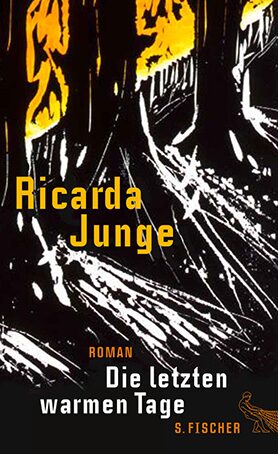Ricarda Junge
Die letzten warmen Tage
[The last warm days]
- S. Fischer Verlag
- Frankfurt am Main 2014
- ISBN 978-3-10-002218-9
- 432 Pages
- Publisher’s contact details
Ricarda Junge
Die letzten warmen Tage
[The last warm days]
Published in Arabic with a grant from Litrix.de.
Sample translations
Always on the move: Ricarda Junge’s atmospheric East-West novel “The last warm days”
Christine works as a doctor at the public health department, where she tests African prostitutes for AIDS - a laborious procedure, for as soon as she draws blood from the clueless patients, they begin to panic and scream. Meanwhile, the women’s pimps are waiting outside the building in their flashy cars. Such scenes, so vivid in detail, are the stuff that make Ricarda Junge’s fourth novel, “The last warm days,” so memorable and entertaining.
The award-winning author, born 1979 in Wiesbaden, has modeled the main character Anna closely on her own biography: both the character and author’s families are from the East, are pastor’s daughters, knew they wanted to write from an early age, and both studied writing at the German Literature Institute in Leipzig - Ricarda Junge then went on to study Protestant theology. Anna describes herself as a second generation “refugee child” with an “inherited sense of loss.” She describes Wiesbaden with a subtle sense of irony, calling it a: “dumb beauty, devotedly snuggling up to the valley, to its dungeon. [...] by comparison, Leipzig was an open field, with exposed flanks to the north, east, south and west.” It is this geographical and temporal contrast between the old sated Federal Republic, which Wiesbaden personifies, and the “new,” yet undefined areas of Leipzig and East Berlin, which gives the novel its far-reaching impact.
The plot jumps back and forth, chapter by chapter, between Anna's youth and her present day life. “Today’s” Anna supposedly works as a freelance copywriter for an online retailer called “Universal Shoes” in Berlin. One evening she meets the businessman Constantin on the street, whose quirks she describes in intricate detail. No wonder Anna can’t quite get involved with him. Just as her mother (the actual main character) had lingered around at the furniture store with her children in tow, unable to make a decision about which curtains or lamps to buy, the adult Anna also is unable to make decisions. She is constantly seeking a locus amoenus: “If we are capable of thinking ourselves into a better place than the one we are in at the moment, why shouldn’t we stay there?” The only sense of security she has is her brother and the desire to write.
At the end we finally discover the fate of the missing grandfather Karl, but it is no longer relevant to Anna's present life. Perhaps Ricarda Junge might have been a bit too faithful to her real family history; causing the story to lose a certain narrative freedom. But Junge’s vivid scenes and language offers an atmospheric panorama of fifty years of German history as seen through the individual fates of her characters.
Translated by Zaia Alexander

By Katrin Hillgruber
The author is a freelance literary critic and cultural journalist based in Munich and was a Litrix.de jury member for literary fiction from 2009-2012.
Publisher's Summary
An intelligent novel about love and family – and simultaneously a book about divided Germany
Twenty-nine-year-old Anna is looking for her lost grandfather, whose story hangs over the life of her family like a shadow. He fled Eastern Germany in August of 1961 and disappeared only a few weeks later. In the course of her research, Anna meets Constantin, manager of an internet company and 20 years her senior. Nonetheless, a passionate love affair develops between the two – until Constantin forces Anna to make a terrible choice. Suddenly, the story of Anna’s grandfather appears in her life, continues in her present: a story of home and flight, love and betrayal, and of the choice which freedom places before one: stay or leave?
(Text: S. Fischer Verlag)
